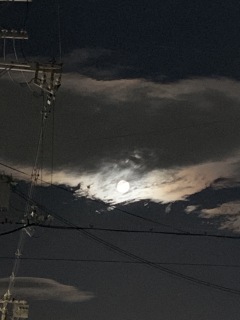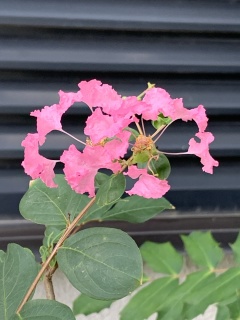mostly language stuff
Sep. 21st, 2024 08:05 pmI didn’t sign up for the Guardian Wishlist this year, but I did have a lot of fun with the many lovely things in the collection, and also wrote four short fics because I couldn’t resist; many thanks to trobadora and china_shop and everyone else for making it happen.
Latest Chinese vocabulary from the farmboys:
一筹莫展 at wits’ end, hitting a wall, up a creek without a paddle
个鬼 stuck onto words, verbs in particular, to indicate “my ass,” “the hell I will,” etc. (I’m glad this one snuck under the wire of the cursing allowed on the show, on account of it’s fun)
么么哒 mwah!, onomatopoeia for a kiss
社恐 short for 社会恐惧症, social phobia/social anxiety, but used colloquially to refer to general shyness/social awkwardness
呼噜 to snore (also to purr, if you’re a cat)
冰溜子 an icicle
Other Chinese-related bits and pieces. Dumb joke (actually doesn’t work in Chinese) for the day: so if someone made a version of the farmboy show that was just the same except in a xianxia setting, would they be cultivators practicing cultivation?
Today’s Chinese/Japanese confusion: me staring at 床の上 and thinking blankly “on the floor? on the bed? ???”. Solution: as long as the の is there it’s probably “on the floor,” if it’s just 床上 it’s probably “on the bed.” Goddamn 假朋友.
Serious question. In English (or in Chinese, for that matter), is there a simple way to refer to “people who sing in Sinophone languages/dialects” that isn’t linguistically/geopolitically difficult? I mean, if I’m talking about Zhou Shen I will say “a Chinese singer” without demur, but what happens when I add in, for instance, A-Mei, Wu Qingfeng, Stefanie Sun, Li Hao, Jike Junyi, Ayanga, Karen Mok…who cover a range of ethnicities/language groups/nationalities for which “Chinese” alone doesn’t seem sufficient, but what’s the alternative? “C-pop” seems awfully vague. Per a-Pei, “Chinese singers” would work when talking to mainlanders but wouldn’t fly with people from Taiwan or Singapore. “Sinophone singers” is kind of awkward (also elen pointed out that “Sinophone band” sounds like somebody invented a new instrument, as in “oh, cool, you played the sinophone in high school too?”). Ideas?
Japanese translation headaches: do I let these characters say “jeez”? I wouldn’t have them say “Jesus Christ” or “oh my God” (interestingly, I might feel okay about using “oh my God” for a text originally in Chinese/a fic for a cdrama, etc., having literally heard people say 我的老天爷 more than once, but the same does not apply in Japanese), but then again “gee” is also (I think?) derived from the same place and it certainly wouldn’t bother me. Where does the line fall?
Chinese translation headaches: in a word, or three, fucking sibling words! 哥 and 姐 in particular are so often used and so flexible that trying to come up with alternatives that do the same job and sound natural is a pain in the ass.
Original stuff: I’ve just hit 30K, which is about right for where I am in my outline; progress has been very slow because I keep putting off writing until the very last thing at night when I’m already sleepy, so I just want to hit my minimum and go to bed. I do not need to do that! I have time in my day I could use for it! but somehow I don’t. Currently I am listening to A asking all the people in her life weird questions and waiting to see what she’s going to do with the answers she gets, since I don’t know either.
I love academics with a sense of humor. Encountered for a work thing, the English-language website of a Peking University|北大 professor whose pocket bio reads “Ruixuan Chen is a man from Middle Earth. He seems to have received some education, and claims to have discovered something – but the details remain obscure and suspect. Little is known of his early life, even the last character of his given name is an issue of dispute. He is now working in Beijing as a translator of Buddhist texts from arcane languages. When he procrastinates, he considers himself a gourmet (de gustibus non est disputandum).”
Rereading Gregory Rabassa’s memoir of a career in literary translation from Spanish and Portuguese, which is very funny and occasionally thought-provoking.
Photos: Bad smartphone photo of the full moon celebrating the Mid-Autumn Festival dramatically; more morning-glories (no, my chili pepper plant is not actually blooming with morning glories, it just looks like it; more crepe myrtle and something else pink; a summer maple; a dinosaur in a company window; and the weirdest vending machine I’ve seen yet, which promises to squeeze you a glass of fresh orange juice on the spot.
Be safe and well.
Latest Chinese vocabulary from the farmboys:
一筹莫展 at wits’ end, hitting a wall, up a creek without a paddle
个鬼 stuck onto words, verbs in particular, to indicate “my ass,” “the hell I will,” etc. (I’m glad this one snuck under the wire of the cursing allowed on the show, on account of it’s fun)
么么哒 mwah!, onomatopoeia for a kiss
社恐 short for 社会恐惧症, social phobia/social anxiety, but used colloquially to refer to general shyness/social awkwardness
呼噜 to snore (also to purr, if you’re a cat)
冰溜子 an icicle
Other Chinese-related bits and pieces. Dumb joke (actually doesn’t work in Chinese) for the day: so if someone made a version of the farmboy show that was just the same except in a xianxia setting, would they be cultivators practicing cultivation?
Today’s Chinese/Japanese confusion: me staring at 床の上 and thinking blankly “on the floor? on the bed? ???”. Solution: as long as the の is there it’s probably “on the floor,” if it’s just 床上 it’s probably “on the bed.” Goddamn 假朋友.
Serious question. In English (or in Chinese, for that matter), is there a simple way to refer to “people who sing in Sinophone languages/dialects” that isn’t linguistically/geopolitically difficult? I mean, if I’m talking about Zhou Shen I will say “a Chinese singer” without demur, but what happens when I add in, for instance, A-Mei, Wu Qingfeng, Stefanie Sun, Li Hao, Jike Junyi, Ayanga, Karen Mok…who cover a range of ethnicities/language groups/nationalities for which “Chinese” alone doesn’t seem sufficient, but what’s the alternative? “C-pop” seems awfully vague. Per a-Pei, “Chinese singers” would work when talking to mainlanders but wouldn’t fly with people from Taiwan or Singapore. “Sinophone singers” is kind of awkward (also elen pointed out that “Sinophone band” sounds like somebody invented a new instrument, as in “oh, cool, you played the sinophone in high school too?”). Ideas?
Japanese translation headaches: do I let these characters say “jeez”? I wouldn’t have them say “Jesus Christ” or “oh my God” (interestingly, I might feel okay about using “oh my God” for a text originally in Chinese/a fic for a cdrama, etc., having literally heard people say 我的老天爷 more than once, but the same does not apply in Japanese), but then again “gee” is also (I think?) derived from the same place and it certainly wouldn’t bother me. Where does the line fall?
Chinese translation headaches: in a word, or three, fucking sibling words! 哥 and 姐 in particular are so often used and so flexible that trying to come up with alternatives that do the same job and sound natural is a pain in the ass.
Original stuff: I’ve just hit 30K, which is about right for where I am in my outline; progress has been very slow because I keep putting off writing until the very last thing at night when I’m already sleepy, so I just want to hit my minimum and go to bed. I do not need to do that! I have time in my day I could use for it! but somehow I don’t. Currently I am listening to A asking all the people in her life weird questions and waiting to see what she’s going to do with the answers she gets, since I don’t know either.
I love academics with a sense of humor. Encountered for a work thing, the English-language website of a Peking University|北大 professor whose pocket bio reads “Ruixuan Chen is a man from Middle Earth. He seems to have received some education, and claims to have discovered something – but the details remain obscure and suspect. Little is known of his early life, even the last character of his given name is an issue of dispute. He is now working in Beijing as a translator of Buddhist texts from arcane languages. When he procrastinates, he considers himself a gourmet (de gustibus non est disputandum).”
Rereading Gregory Rabassa’s memoir of a career in literary translation from Spanish and Portuguese, which is very funny and occasionally thought-provoking.
“Then there are those people…who assert that God’s name is, in fact, Howard, as in ‘Our Father which art in Heaven, Howard be thy name.’ I can’t see how anyone could be an atheist with a God named Howard and it also might explain why the universe is such a mixed-up place.”
“There were two types of parlance that I encountered in the army. The first was official military-speak, which to my still-civilian ear seemed backwards and silly, as in ‘gloves wool olive-drab.’ The second was soldier-speak, much more colorful and inventive… I remember the posted outcome of some court-martial proceedings that combined the two aspects into a delightful linguistic merger. It seems that a soldier had been brought up on charges of insubordination and the specific charge said in part ‘…and upon being reprimanded by Sgt. [So-and-So] did call Sgt. [So-and-So] a mother-fucking son-of-a-bitch or words to that effect.’ The intriguing problem is trying to ascertain what other words might have had that same effect.”
“I’ve tried to figure out if [knowing an author personally] is of any help for a translator beyond direct questions, whether a sense of nearness lets me hear the voice of these particular people as I interpret their words. If I am the translator I am supposed to be, it really shouldn’t make any difference and yet I do hear their voices along with their personal pronunciations and intonations. This is that misty world of translation that is hard to describe.”
(Also Rabassa employs the neologism “tauroscatic” (referring to a particular manner of speech) which I find delightful.)
“There were two types of parlance that I encountered in the army. The first was official military-speak, which to my still-civilian ear seemed backwards and silly, as in ‘gloves wool olive-drab.’ The second was soldier-speak, much more colorful and inventive… I remember the posted outcome of some court-martial proceedings that combined the two aspects into a delightful linguistic merger. It seems that a soldier had been brought up on charges of insubordination and the specific charge said in part ‘…and upon being reprimanded by Sgt. [So-and-So] did call Sgt. [So-and-So] a mother-fucking son-of-a-bitch or words to that effect.’ The intriguing problem is trying to ascertain what other words might have had that same effect.”
“I’ve tried to figure out if [knowing an author personally] is of any help for a translator beyond direct questions, whether a sense of nearness lets me hear the voice of these particular people as I interpret their words. If I am the translator I am supposed to be, it really shouldn’t make any difference and yet I do hear their voices along with their personal pronunciations and intonations. This is that misty world of translation that is hard to describe.”
(Also Rabassa employs the neologism “tauroscatic” (referring to a particular manner of speech) which I find delightful.)
Photos: Bad smartphone photo of the full moon celebrating the Mid-Autumn Festival dramatically; more morning-glories (no, my chili pepper plant is not actually blooming with morning glories, it just looks like it; more crepe myrtle and something else pink; a summer maple; a dinosaur in a company window; and the weirdest vending machine I’ve seen yet, which promises to squeeze you a glass of fresh orange juice on the spot.
Be safe and well.








